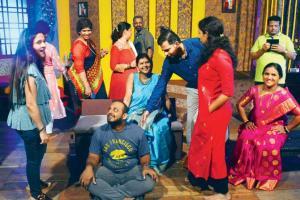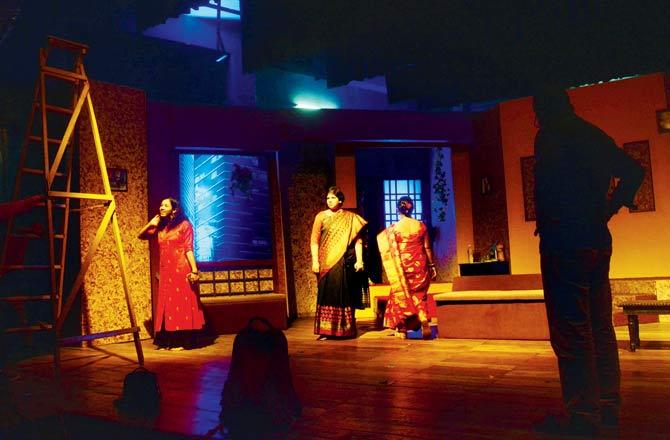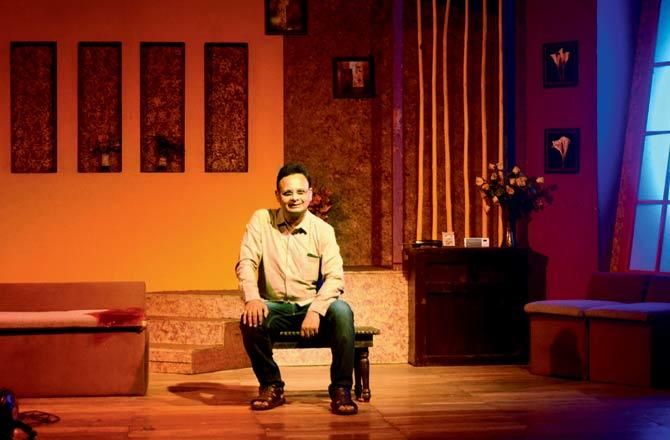A Marathi writer-director plucks up courage to stage a performance with rank newcomers who portray men, including the famous, accused of sexual harassment

The director chose not to cast seasoned actors. #MeToo's cast members have day jobs, as varied as, radiology, commercial photography and marriage counselling. Pics/Satej Shinde
 A public movement, built block-by-block by individual voices over a period of time, can lose power if the stakeholders fail to keep the issue at the forefront of public consciousness. Theatre director and playwright Raju Tulalwar fears the same fate for India's #MeToo movement, which had peaked exactly around this time last year. The two-act Marathi play #MeToo by his fledgling group, Theatre Academy Thane, will see its fifth show at Gadkari Rangayatan this week. A cast of nine women and eight male actors, half of them first timers, are rallying around him to "do our bit to keep the issue burning." They all live between Mumbai and Thane and have day jobs ranging from radiology to commercial photography and even marriage counselling. Tulalwar, 58, has been associated with children's theatre for over three decades. He first wrote this play for a one-act contest in Ahmednagar, which won the jury award.
A public movement, built block-by-block by individual voices over a period of time, can lose power if the stakeholders fail to keep the issue at the forefront of public consciousness. Theatre director and playwright Raju Tulalwar fears the same fate for India's #MeToo movement, which had peaked exactly around this time last year. The two-act Marathi play #MeToo by his fledgling group, Theatre Academy Thane, will see its fifth show at Gadkari Rangayatan this week. A cast of nine women and eight male actors, half of them first timers, are rallying around him to "do our bit to keep the issue burning." They all live between Mumbai and Thane and have day jobs ranging from radiology to commercial photography and even marriage counselling. Tulalwar, 58, has been associated with children's theatre for over three decades. He first wrote this play for a one-act contest in Ahmednagar, which won the jury award.
ADVERTISEMENT
Enthused, he reworked the script with two gender-exclusive acts—one hour devoted to the women's narratives of sexual manipulation, followed by a second act of male confessions and honest inquiries into the sexual etiquette of the day. At the foundation of both lie candid drawing room conversations over changing social mores, contained within a box set designed by Prasad Walavalkar. The conversations touch almost every aspect of the debate—from delayed registering of police complaints, court trials, social media buzz around celebrity instances, social excommunication faced by families of perpetrators and survivors, and most importantly, the way forward. The script avoids an extreme standpoint or irrational cure-alls. Most importantly, the nuances in each story emerge prominently. Neither men nor women are portrayed as unidimensional. For instance, the women recounting exploitation are cognizant of the supportive men in their lives; similarly, men accused of serious misdemeanour admit to the second and third chances of reform allowed to them by women colleagues and spouses.

At Shivaji Mandir, where a staging was scheduled on Gandhi Jayanti, I was surprised to see a nuanced representation of the movement in the play, which had an unimaginative title to begin with. The play was relevant and carried on the shoulders of a raw, untried cast doing a convincing job. I was visualising Marathi stage veterans (particularly a male performer like Vikram Gokhale or Sanjay Mone) and I couldn't imagine how they would set aside their personal glamour, if they had essayed any of these roles. Tulalwar deserves credit for bringing the freshers up to speed, although there is no denying that there is room for improvement in voice modulation despite multiple acting workshops. It is commendable that actors treat it as a project-in-progress without wearing a we-have-arrived air.
The #MeToo movement in India drew from the strength of its international counterpart, but found meaning when in October 2018, actor Tanushree Dutta spoke again of the sexual harassment she faced by veteran star Nana Patekar on the sets of Horn Ok Pleassss. The resignation of Minister of State (MoS) for External Affairs MJ Akbar, who was accused by women colleagues, was the climax in every sense. Tulalwar's play catches the Bollywood epicenter and the arc of the movement. It names Nana and other celebrities, but moves on without indulging in slander. It doesn't veer away from the focus of a power dynamic vis-à-vis gender equations. Also the play is very clear about the cosmos in which it is set. "We wanted the debate to be rooted in the urban middle-class drawing room because, frankly speaking, we all hail from that milieu. We cannot claim to know the reality across classes."

A play that deals with a social issue runs the risk of messing the finale. The end could become propagandist or preachy, if the cast steps out of character and addresses the audience. But, both acts of #MeToo end well—the first, on a defining note struck by women who share compelling personal reasons to be part of this play; the second begins with introspection, ending with a collective male resolve to bring about a healthy change in perception. While sexual misconduct cases reported in Indian cinema industry, television and theatre remain inconclusive, this play is doing its bit to keep the conversation alive.
Sumedha Raikar-Mhatre is a culture columnist in search of the sub-text. You can reach her at sumedha.raikar@mid-day.com
Catch up on all the latest Crime, National, International and Hatke news here. Also download the new mid-day Android and iOS apps to get latest updates
 Subscribe today by clicking the link and stay updated with the latest news!" Click here!
Subscribe today by clicking the link and stay updated with the latest news!" Click here!






